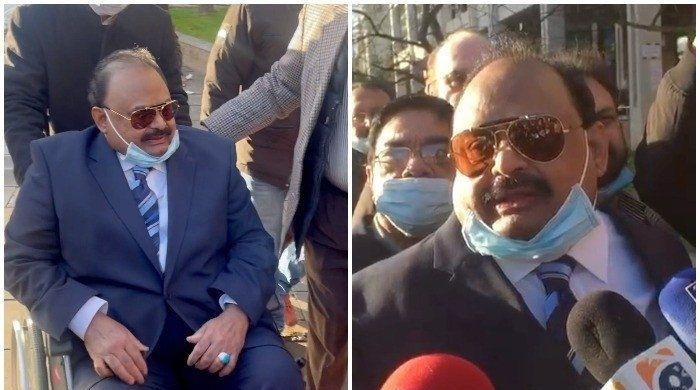FOOLS_NIGHTMARE
ELITE MEMBER

- Joined
- Sep 26, 2018
- Messages
- 18,063
- Reaction score
- 12
- Country
- Location
The Crown Prosecution Service has concluded its case against the MQM leader Altaf Hussain at the Kingston Crown Court, urging the jurors to consider Hussain’s tone, tenor, and words when he allegedly urged his followers to commit acts of violence in Karachi on August 22, 2016.
In making a closing speech, the prosecutor addressed the jurors on Thursday afternoon, stating that there is a general rule that "one man’s terrorist is another man’s freedom fighter," but that this was a different case as the jury would have to consider whether the defendant committed the two charges/counts alleged against him. The two counts set out before the jury, relate to Hussain’s first speech, made at 07.30am (UK time) from London to Karachi, and the second speech, made at 11.30 (UK time), which continued till PK time 05.16pm (1316 UK).
Related items
- Expert tells UK court about Altaf Hussain's rise, violence, extrajudicial killings
- Jury takes oath in Altaf Hussain’s terror incitement trial
- MQM-P doesn't have support of Urdu-speaking communities: Altaf Hussain
The prosecutor asked the jury not to look at the cultural aspects of Pakistani politics but at the laws of England and Wales that apply to everyone in this jurisdiction.
These laws apply to everyone who comes to live here or seeks refuge here, said the prosecution adding that was happened on the morning and afternoon of 22nd August 2016 resulted directly in acts of violence. The law says you may not encourage that to advance a political cause, to influence the government or intimidate a section of the public, and that’s precisely what Altaf Hussain did, as in what was called for, what he intended, and what he achieved.
The prosecutor said the three elements of these charges are encouraging acts of terrorism, whether Altaf Hussain published a statement, and that there is no doubt that those two speeches were in fact made in a particular tone, manner, and delivery.
The prosecutor told the jury that Altaf Hussain’s statements were likely to be understood by a reasonable person hearing them as a direct/indirect encouragement to commit the act(s) of terrorism.
The prosecutor explained to the jury to consider the intention and objective of Altaf Hussain when he asked his followers to rise up against the DG Rangers and TV channels including Geo, ARY, and Samaa in inciting them as set out in count one of the charge. The prosecutor said that these words were spoken by a leader of a large, potentially successful organisation to those behind the cause of the Muhajir community.
The prosecutor then turned to the speeches Hussain made. He told the jury that during the early morning address, Altaf Hussain spoke of "revolution," "rebellion," and the focus was on the interests, ideology, and political aims of the MQM. The prosecutor told the jury that Hussain asked his followers in the morning address to "march to Rangers HQs," "get Director-General Bilal Akbar outside," "recite Kalima," and "come out, gather outside the Press Club," with references to anchorpersons, Punjabi lot, and the police.
The prosecutor said that Altaf Hussain here attempted to excuse the past behaviour of the MQM and talked about the MQM’s martyrs, urging his followers to "If you have a sense of honour, come on foot" and "I need 500,000, I require 500,000, to shove inside Rangers HQ and get Bilal Akbar." The crowd responded that they would shove.
The prosecution informed the court that Hussain said: "the TV channel that abuses MQM, gently tells the cameramen, take your camera and leave." The prosecution said that Hussain asked his followers to go to Rangers HQ and then "go to Geo and ARY and their officers". When Altaf Hussain asked his followers whether they wanted to do this or return home and do nothing, the crowd chanted that they were willing to lay down their lives for him.
The prosecution said the motivation here was to assemble in an overwhelming number and go to Rangers HQs, drag out (or kidnap) Bilal Akbar, knowing that the only way that could occur is by violence. Prosecutors said that he was very serious when he said that he wanted the crowd to get involved in the most violent fights possible.
The prosecution said that Hussain’s other invitation was directed at the media, against those who have not/will not toe his line, publish his words and message, and that they have to be put off, terminated, or rendered useless. The prosecutor said that Hussain was banned by the Lahore High Court and his "freedom of speech" was stifled. "Think about this, he is a man who wants his supporters to physically overrun the people and places that otherwise produce legitimate broadcasts and silence them," said the prosecutor.
In the second count of the charge, the prosecution said, Hussain targeted the state of Pakistan, Nawaz Sharif, the Sindh government, Bilal Akbar, Raheel Shareef, and worked up the crowd against the security forces. The prosecution asked the jury to see that the types of acts Hussain asked his followers to commit included shutting down TV channels for the purpose of influencing the government in the political interests of the Muhajirs, with a degree of racial, ethnic, and ideological interests as represented by the MQM.
The prosecution said that Altaf Hussain issued a command —that under English law — amounts to an act of terrorism (inciting violence).
The prosecution said that following Hussain’s command, the crowd walked straight outside, with female activists at its head, to the front gates of ARY, where "hapless" police officers were surrounded and "beyond doubt, there was serious violence".
The prosecution told the jury that a police officer was surrounded, his weapon pulled from him, his weapon brandished, and he was beaten. One man was killed, fires were set, and police vehicles were set alight, the prosecution told the jury.
The prosecutor said: "His speech was designed to influence people, incite violence, intimidate the government, and for a political cause. No amount of appeal to rights or freedoms or anything else can stand in the way of that. Because the right of others is to enjoy liberty and access to property, he sought to deprive people of that. "
Altaf Hussain denies the charges and has maintained that he didn’t commit any violence. His defence lawyer will open the case on Friday.

Prosecution closes argument in Altaf Hussain’s incitement case
Prosecution urges jurors to consider Hussain’s tone, tenor, and words when he had incited violence in Karachi on August 22, 2016




